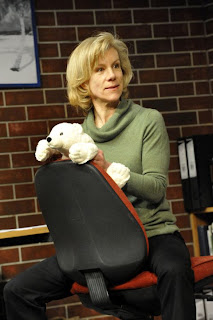The script is both insightful and reflective, some of the characters having obvious roots in the men and women that Rattigan knew in the war. The result is that the characters feel very real indeed, their nervousness and their stiff upper lip being painfully true to life. A few of the lines were given a comic effect that I’m not sure was intended in the script but apart from these there were very few moments where the play seemed dated in any way. It was a deeply moving if somewhat heavy-handed piece. I say heavy-handed because a few of the speeches and conversations were obviously engineered to make a point or to put a certain opinion across but their clumsiness does not detract from the authenticity of the sentiment or their effect on the audience. It is a deeply moving piece that puts one in the shoes of the generation that were forced to do what we hope to never have to. The only thing I didn’t like was the ending. I thought it could benefit from a harsher and more realistic finish as opposed to smiles all round. It would have given the play a more potent effect.
The acting throughout was brilliant and led from the front by Harry Hadden-Paton as Teddy and Sheridan Smith as Doris, though I’m not downplaying the talents of Sienna Miller, James Purefoy, Mark Dexter or Joe Armstrong et al. James Purefoy’s Peter Kyle was the embodiment of the arrogant but fundamentally empty and needy actor who fails to see the validity in anything outside of his own happiness. His part tossed and turned from flippant to distraught through comical and serious and at all points he maintained the reality of the character against the backdrop of the servicemen, keeping himself distant and apart from their very real world.
Sienna Miller also played her part very well indeed, a magnificent performance and painful to watch at times as she thrashed out between what she wanted and what she needed to do. Her conflict of interests between running away with her high-flying Hollywood romance or staying put with the Flight Lieutenant who needed her brought out the most challenging aspects of her character and she handled all of them naturally and the result was a compelling performance. I would say, however, that both Purefoy and Miller were overshadowed by the magnificent performance of Harry Hadden-Paton. Playing the hero of the group, the man everyone looks up to and the joker in the pack while deep down suffering from some very real and debilitating issues makes for a very difficult job indeed. He stands up to the challenge and makes his mark on the character, giving Teddy the respect he deserves. Your emotional investment in him doesn’t come as a surprise, but the strength of it does.
The talents of Sheridan Smith are not to be overlooked, either. Her character is nuanced and utterly believable from the moment you meet her asleep in her chair to the moment you leave her at the end. Her ability to maintain the nervous energy of Doris is remarkable, especially considering what the character is forced to deal with. Fantastic work brilliantly completed by the work of Mark Dexter as her husband, Johnny. The Polish accent is flawless and the characterisation behind it equally adept. It is perhaps the most difficult role to play in terms of practically doing it but he shines through as a natural talent in doing so.
I would feel remiss if I didn’t mention Joe Armstrong here because I thought his performance was superb. Playing the part of the pessimistic joker he worked very well with Harry Hadden-Paton and added another colour of intentional humour to the show that was much needed and valued because of how well it was done.
Trevor Nunn’s production is a fine return to form after the disappointing Birdsong, another war story. He doesn’t seem to have shaken it off completely, however, with the projection finding new life in the form of a banner across the top of the stage. Thankfully it was only used once but even that was too much. It detailed the take off of the bombers at the end of the first act and focus was so drawn to the projection that the actors could have been doing the hokey-cokey completely stark naked on stage and only the people in the stalls would have even thought of noticing it. Apart from distracting from the acting, which was far too good to justify distracting attention away from it, the projections removed the element of imagination from the very tense scene and as a result the suspense was destroyed. Apart from this, though, it was a very good showing indeed. The whole show was coherent and unified in a way that is symptomatic of the strong direction one can expect from someone with the calibre of Trevor Nunn.
I would recommend this show to anyone as a vast improvement over Nunn’s recent endeavours with Birdsong and label it as unmissable if you have an interest in any of the themes or situations involved. Well worth it.
Written by Terence Rattigan; Directed by Trevor Nunn; At the Theatre Royal Haymarket; Starring Sienna Miller, James Purefoy, Sheridan Smith, Harry Hadden-Paton, Joe Armstrong, Mark Dexter, Sarah Crowden, Jim Creighton; Runs from 04 March 11 - 04 June 11.
John Ord (23/03/2011)














